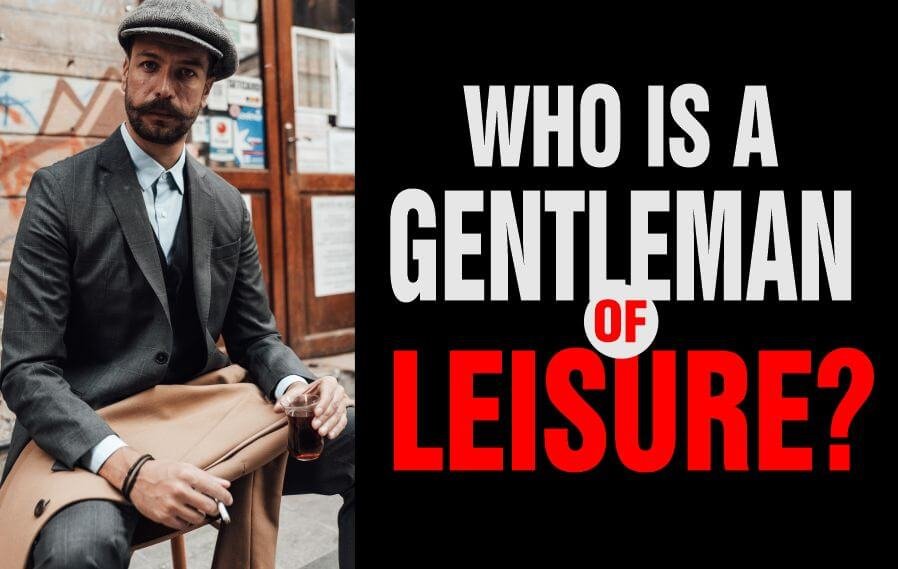There are many shades of gentlemen and the gentleman of leisure who conjures an image of refined elegance is one of them.
With graceful ease, he is a figure synonymous with a life of leisure and privilege.
I can remember hearing those words when I was a kid under my father’s tutelage, who was a refined gentleman. However, it never made much sense until I researched this topic.
At first, you could think the figure is a man of easy virtue, a lazy man whose only interest is leisure and the good things of life.
But let’s find out.
Key Takeaways
- A gentleman of leisure lives a life of luxury, indulging in cultural, social, and intellectual pursuits without the need for regular work.
- Historically, gentlemen of leisure were wealthy individuals who prioritized arts, literature, and philosophy.
- Modern gentlemen of leisure balance privilege with responsibility, using their status to positively impact society and promote cultural enrichment.
- Challenges for gentlemen of leisure include societal biases against unproductiveness and redefining success beyond traditional career achievements.
Table of Contents
- Key Takeaways
- Gentleman of Leisure Meaning
- Characteristics of a Gentleman of Leisure
- Challenges and Criticisms of the Gentleman of Leisure
- Examples of Gentlemen of Leisure in History
- Living the Gentleman of Leisure Lifestyle in Modern Society
- Inspiring Quotes from Gentlemen of Leisure
- Conclusion
Gentleman of Leisure Meaning
A gentleman of leisure is a refined individual who lives a life of luxury and privilege without the need for regular work, often indulging in cultural, social, and intellectual pursuits.
Embracing a world of cultivated and leisurely pursuits, he revels in cultural refinement, social engagements, and intellectual curiosity.
Historically associated with the upper echelons of society, this enigmatic character represents the essence of sophistication and poise.
Whether immersed in the arts, mingling with high society, or savouring leisurely pursuits, the man of a privileged lifestyle exudes an aura of timeless charm and savoir-faire.
Recommended: The Rudiments of True Gentlemanliness
A Brief History of the Gentleman of Leisure
The concept of the life of leisure traces its roots back to ancient civilizations, where affluent individuals in societies like Ancient Greece and Rome had the luxury to focus on cultural, intellectual, and leisurely pursuits.
In these early civilizations, the privileged class was freed from the burden of labour, enabling them to indulge in arts, literature, and philosophical discussions.
During the Renaissance in Europe, the idea of the elegant lifestyle reached its zenith.
Wealthy nobles and aristocrats, supported by inherited fortunes and estates, devoted their time to education, patronage of the arts, and the cultivation of refined tastes.
They sought to embody the ideals of a well-rounded, educated individual capable of appreciating and contributing to the arts and sciences.
Related: The Countryman of Elegance
Throughout the 18th and 19th centuries, the elegant life of leisure became synonymous with the upper classes, characterized by a life of opulence, leisure, and social prominence.
The Victorian era further emphasized the importance of etiquette, elegance, and propriety in such circles, as gentlemen engaged in pastimes like horse riding, hunting, and leisurely travels.
However, with the rise of industrialization and capitalism in the 20th century, the notion of the gentleman of leisure began to dampen.
While the privileged class still enjoyed leisurely pursuits, the concept faced criticism for perpetuating social inequalities and a lack of contribution to society.
Today, the idea of a life of leisure persists, but it has adapted to modern sensibilities, where emphasis is placed on balancing leisure with meaningful engagement and social responsibility.
Related: What Men at 40 Should Expect
Characteristics of a Gentleman of Leisure

The characteristics of a life of leisure revolve around a refined lifestyle, privilege, and the pursuit of intellectual and cultural activities.
It’s essential to recognize that the concept of a life of leisure has evolved over time.
Related: How to Express Gentlemanliness in Different Situations
Today, being a gentleman of leisure often goes beyond a mere display of wealth and luxury; it emphasizes the responsible use of privilege to positively impact society and promote cultural enrichment.
Here is a detailed explanation of these characteristics:
- Refined Lifestyle: A gentleman of leisure exudes elegance and sophistication and carries himself with grace and poise, demonstrating manners and etiquette that are befitting of his privileged status.
- Privilege and Financial Comfort: Gentlemen of leisure enjoy a life of financial security and privilege because they often come from affluent backgrounds, inherited wealth, or have successful careers that afford them the luxury of not needing to engage in regular employment.
- Leisurely Pursuits: The gentleman of elegant life embraces various leisure activities. He may explore the arts, literature, and music, or participate in hobbies and sports purely for enjoyment, not out of necessity.
- Cultivated Tastes: Having the time and means to appreciate culture, the gentleman of leisure is often a patron of the arts, contributing to galleries, theaters, and cultural events. He has a refined taste and an appreciation for aesthetics.
- Social Grace and Ease: The life of leisure is adept at navigating social situations. The elegant gentleman of leisure possesses excellent social skills and can effortlessly engage in conversations with people from different backgrounds.
Related: Many Challenges the Gentleman is up Against
- Intellectual Curiosity: The pursuit of knowledge is central to the character of the leisurely gentleman. He engages in intellectual discussions, reads extensively, and seeks to expand this understanding of the world.
- Civic Engagement: In modern times, being a gentleman of leisure often involves contributing to society through philanthropy, community service, or supporting charitable causes.
- Calm Demeanor: A gentleman who lives a life of leisure maintains composure even during challenging situations. He doesn’t succumb to pressure easily and handles setbacks with dignity.
- Living Life without Having to Work for a Living: Living life without having to work for a living is a defining characteristic of a life of leisure. This privileged individual enjoys financial comfort, allowing them to pursue cultural, social, and intellectual pursuits without the burden of regular employment.
- Focus on Self-care and Well-being: A gentleman of leisure prioritizes self-care and well-being, taking the time to nurture physical and mental health. With freedom from work-related stress, they indulge in activities that promote relaxation, rejuvenation, and overall personal growth.
Related: Becoming a Man of Integrity and Truth
Challenges and Criticisms of the Gentleman of Leisure

While this lifestyle may hold appeal for some, it also faces challenges and criticisms from society.
Three key challenges and criticisms are social and cultural biases, misconceptions and stereotypes, and the need to redefine success and value beyond work.
Let’s take a closer look at these criticisms and challenges:
Social and Cultural Biases Against Gentlemen of Leisure
Traditional Work Ethic: Society often emphasizes the value of hard work and productivity, leading to a bias against individuals who prioritize leisure and personal fulfillment.
This bias stems from the belief that work is inherently virtuous and that any alternative lifestyle is seen as lazy or unproductive.
The Stigma of Unproductiveness: Gentlemen of leisure may be judged as unproductive members of society since their lifestyle does not contribute to the economy in conventional ways. This can lead to the perception that they are freeloaders or are not contributing their fair share.
Pressure to Conform: There is a societal expectation for individuals to pursue traditional careers and conform to societal norms. Gentlemen of leisure may face pressure to conform to this expectation and abandon their leisure-focused lifestyle.
Related: Understanding the Gentleman’s Valet
Misconceptions and Stereotypes
Lack of Ambition: One common misconception is that gentlemen of leisure lack ambition, drive, or goals. They are often stereotyped as individuals who are simply avoiding responsibility or escaping the pressures of the real world.
Financial Privilege: There is a stereotype that gentlemen of leisure are only able to pursue this lifestyle because of inherited wealth or personal connections. This stereotype overlooks the possibility of individuals who have intentionally made lifestyle choices to prioritize leisure over financial gain.
Lack of Purpose: It is often assumed that individuals who prioritize leisure do not have a sense of purpose or direction in life. This overlooks the fact that they may find fulfillment through personal growth, hobbies, or other non-traditional pursuits.
Related: Identifying a True Gentleman
The Need to Redefine Success and Value Beyond Work
Work-centric Definition of Success: Society often defines success solely based on professional achievements, career advancement, and financial status. The gentleman of leisure challenges this narrow definition and argues for a more holistic view of success that includes personal fulfillment, happiness, and a balanced lifestyle.
Mental and Physical Well-being: By prioritizing leisure and personal fulfillment, he recognizes the importance of mental and physical well-being. He emphasizes the need for self-care, relaxation, and time for personal interests, which may be overlooked in a solely work-focused life.
Creativity and Non-traditional Contributions: Gentlemen of leisure may engage in creative pursuits, philanthropy, or community involvement, contributing to society in non-traditional ways. They argue that these contributions are valuable and should be recognized as important forms of success.
Examples of Gentlemen of Leisure in History
The following historical figures exemplify the concept of gentlemen of leisure, as they enjoyed the luxury of financial security and societal status.
This allowed them to immerse themselves in cultural, intellectual, and artistic pursuits without the necessity of engaging in regular employment.
Artists, Philosophers, and Intellectuals

Leonardo da Vinci (1452-1519)
Leonardo da Vinci, the quintessential Renaissance polymath, exemplified the qualities of a gentleman of leisure.
Gifted with artistic brilliance, scientific curiosity, and an inventive mind, he enjoyed financial support from patrons like the Medici family.
Freed from the burdens of regular work, he delved into a vast array of intellectual pursuits, creating timeless masterpieces, conducting groundbreaking scientific inquiries, and embracing the pleasures of cultured living, epitomizing the ideal of a gentleman of leisure.

Voltaire (1694-1778)
Voltaire, the influential Enlightenment thinker, reflected the essence of a gentleman of elegance.
As a prolific writer and philosopher, he enjoyed the patronage of wealthy benefactors, enabling him to focus on his intellectual pursuits without the constraints of regular employment.
His wit, critical insights, and social prominence exemplified the refined lifestyle of a gentleman of leisure, contributing to the cultural and philosophical landscape of his time.
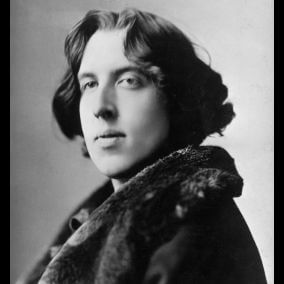
Oscar Wilde (1854-1900)
Oscar Wilde, the renowned playwright and author, was a gentleman of a privileged lifestyle with his witty and flamboyant living.
As a gifted literary figure, Wilde enjoyed financial support from affluent friends and patrons, allowing him to focus on his artistic pursuits without the need for conventional work.
His refined tastes, cultural engagements, and intellectual brilliance mirrored the essence of a gentleman of leisure, leaving a lasting legacy in literature and society.
Aristocracy in Different Eras
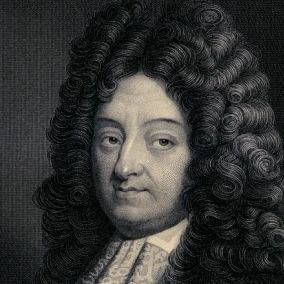
Louis XIV of France (1638-1715)
Louis XIV of France, known as the “Sun King,” personified the gentleman of leisure as the epitome of absolute monarchy and aristocracy.
Residing in the opulent Palace of Versailles, he indulged in lavish luxury, surrounded by courtly pleasures, cultural patronage, and grand social events.
Freed from financial worries and the need for labor, Louis XIV embraced a life of leisure, leaving an enduring legacy of grandeur and cultural influence in history.
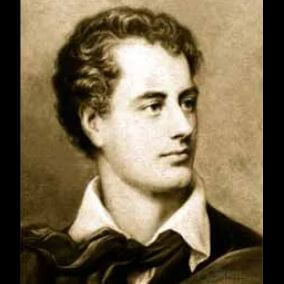
Lord Byron (1788-1824)
Lord Byron, the Romantic poet, was a gentleman of elegance who lived a life of leisure with his aristocratic background and literary brilliance.
As a member of the British aristocracy, he enjoyed financial security, enabling him to pursue his poetic passions without the constraints of regular work.
Byron’s extravagant lifestyle, travels, and artistic pursuits reflected the essence of a gentleman of leisure, leaving an indelible mark on literature and the Romantic movement.
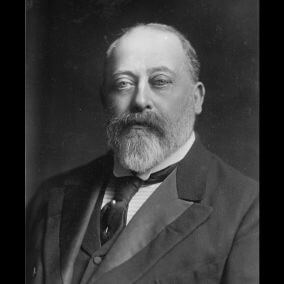
Prince Albert Edward (1841-1910)
Prince Albert Edward, later known as King Edward VII of the United Kingdom, embraced the life of leisure during his time as Prince of Wales.
As the heir to the throne, he enjoyed financial comfort and societal status, allowing him to indulge in social activities, cultural engagements, and leisurely pursuits.
His refined tastes, love for fine arts, and elegant lifestyle symbolize the essence of a gentleman of leisure, leaving a lasting impact on British society.
Related: Who is the Gentleman of the United Kingdom?
Living the Gentleman of Leisure Lifestyle in Modern Society
Living the gentleman of leisure lifestyle today refers to the choice of living a life characterized by relaxation, pleasure, and personal leisure pursuits.
It is an intentional decision to prioritize personal enjoyment and fulfillment over traditional societal notions of productivity and work-centeredness.
This lifestyle is often associated with individuals who value a slower pace of life, indulge in hobbies, and pursue leisure activities to enhance personal well-being and happiness.
Here are ways to achieve this lifestyle in modern society:
Overcoming societal expectations and pressures
Living the gentleman of leisure lifestyle may require overcoming societal expectations and pressures, as society often places great importance on productivity, ambition, and career success.
To overcome these expectations and pressures, you will need to redefine success for yourself and focus on personal fulfillment, happiness, and overall well-being, rather than prioritizing career achievements solely.
It may involve challenging traditional notions of success and finding contentment in your own leisure pursuits and self-development, rather than conforming to external pressures.
Balancing Work and Leisure
Balancing work and leisure is important when embracing the leisure lifestyle.
It involves finding a way to fulfill professional responsibilities while still making time for personal relaxation and leisure activities.
This can be achieved by adopting strategies such as time management, setting boundaries between work and personal life, and prioritizing leisure time as an essential part of overall well-being.
By effectively managing work commitments and allocating dedicated periods for leisure, you can strike a balance that allows you to experience both personal enjoyment and professional success.
Cultivating Hobbies and Interests
Cultivating hobbies and interests is an integral part of the gentleman of the leisure lifestyle which involves actively pursuing activities outside of work that bring joy, relaxation, and personal growth.
Hobbies can range from creative endeavors such as painting, playing an instrument, or writing, to physical activities like gardening, hiking, or playing sports.
By nurturing and exploring hobbies and interests, individuals can find a greater sense of purpose, self-expression, and fulfillment outside of their professional lives.
Engaging in hobbies also provides opportunities to meet like-minded individuals, enhance skills, and develop a well-rounded identity beyond work.
Related: Kindness and Empathy: Powerful Traits of a Gentleman
Inspiring Quotes from Gentlemen of Leisure
These inspiring quotes from historical gentlemen of leisure and contemporary advocates highlight the importance of leisure, wisdom, and balance in leading a fulfilling and enriched life.
- Oscar Wilde: “I can resist everything except temptation.” – This humorous quote reflects Wilde’s wit and his ability to embrace the pleasures of life, embodying the spirit of a gentleman of leisure who enjoyed indulgence and refinement.
- Voltaire: “Doubt is not a pleasant condition, but certainty is absurd.” – Voltaire’s words divulge the essence of intellectual hunger and open-mindedness, a trait often expressed by gentlemen of leisure who seek knowledge and engage in philosophical inquiry.
- Lord Byron: “The best prophet of the future is the past.” – Byron’s quote reflects the wisdom gained from history, an attribute of gentlemen of leisure who value learning from the past to shape their refined perspectives on life.
Contemporary Individuals Who Advocate for Leisure
- Tim Ferriss: “Being busy is a form of laziness – lazy thinking and indiscriminate action.” – Ferriss advocates for the intentional use of leisure and time management, emphasizing that true leisure involves meaningful engagement and self-care.
- Arianna Huffington: “We think, mistakenly, that success is the result of the amount of time we put in at work rather than the quality of time we put in.” – Huffington encourages the redefinition of success beyond work-centric values, promoting the importance of leisure and balance in achieving fulfillment.
- Carl Honoré: “In Praise of Slowness: Challenging the Cult of Speed.” – Honoré’s book title emphasizes the need to embrace a slower pace and leisurely living, challenging the fast-paced modern world’s obsession with constant productivity.
Related: The Interests and Hobbies of the Rural Gentleman
Conclusion
A gentleman of leisure personifies a timeless ideal of refined elegance, cultural appreciation, and a life free from the constraints of regular work.
From historical figures like Leonardo da Vinci and Voltaire to contemporary advocates like Tim Ferriss and Arianna Huffington, they remind us of the importance of intellectual pursuits, self-care, and a balanced lifestyle.
As society evolves, the concept of a life of leisure urges us to redefine success beyond mere work achievements, encouraging us to prioritize leisure, personal growth, and well-being.
Embracing leisure as a means to nurture the mind and soul, we can aspire to lead fulfilling lives, becoming true modern-day gentlemen of leisure.
References:
Pyo Merez is a men’s lifestyle enthusiast and writer about the gentleman’s place and impact on society. Raised by a distinguished gentleman dad, he offers unique insights into how the mind of a gentleman works and how societal norms shape gentlemen’s identity and vice versa.
Through his insightful articles, Pyo taps into the depths of gentleman culture to provide perspectives on etiquette and manners in modern society.

